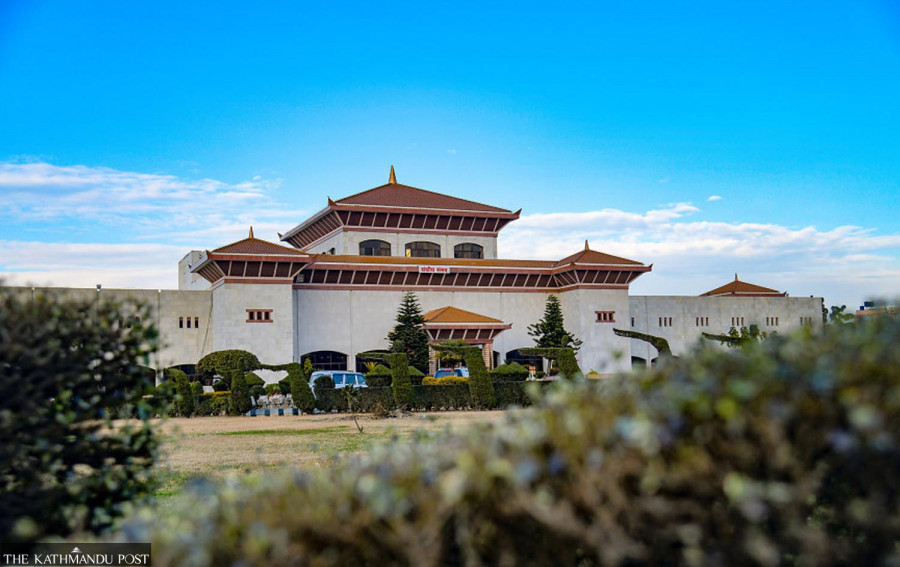National
Government bet big on current House session. It turns out to be a dud
With closure of winter session of Parliament days away, several crucial bills will fail to become laws this time too.
Binod Ghimire
The ongoing session of Parliament, which the government promised would be productive, is being prorogued without endorsing vital bills including those related to full-fledged implementation of federalism that have long been pending.
More than two months since its commencement, the winter session, also called the bill session, has endorsed just three bills. President Ramchandra Paudel has already authenticated the bill to manage monitoring and evaluation of development policies, programmes and plans, while anti-money laundering and food purity and quality bills await his seal.
Before the session’s commencement, the Ministry of Law, Justice and Parliamentary Affairs had claimed that various ministries were working on as many as 109 bills.
The Federal Civil Service Bill, the Media Council Bill, the Bill to Manage Social Media, the Mass Media Bill and Police Bill, among others, were on priority. The government had also announced a plan to register amendment bills to several Acts in order to streamline new investments.
However, only five bills have been registered in the federal parliament since the current session commenced on February 5. Except for the Federal Civil Service Bill, no priority bills have been registered. The chances for the registration of new bills in this session are slim.
“This session will continue for another week,” Mahesh Bartaula, the CPN-UML chief whip, told the Post. The next meeting of the House of Representatives has been called for Sunday. And it would at most sit five times until it is prorogued.
“We can endorse one more bill and send the Federal Civil Service Bill to the House committee if the Nepali Congress cooperates,” said Bartaula. The largest party in the House has been obstructing its proceedings demanding a parliamentary panel to probe the charges of cooperative funds embezzlement against Deputy Prime Minister and Minister for Home Affairs Rabi Lamichhane.
The Congress parliamentary party meeting on Tuesday decided that the formation of the probe committee was the party’s bottom line to allow the House to function. As the ruling parties firmly stood against the demand, the deadlock’s immediate resolution seems unlikely.
As many as 23 bills are under consideration in the two houses and their committees, as per the records at the Parliament Secretariat. Of them, two are in the final stage of endorsement. The bill to amend the Enforced Disappearances Enquiry, Truth and Reconciliation Commission Act and the school education bill, among the priority bills for the Pushpa Kamal Dahal administration, will not be endorsed in the present session as well.
The victims of the decade-long insurgency and human rights defenders have long been pressuring the government and the political parties to endorse the transitional justice bill. Only by endorsing a bill that adheres to international standards and repetitive Supreme Court orders will bring the derailed transitional justice process back on track, they claim. On the other hand, school education law is a must to delegate the constitutional authority of the local governments in school education.
The current parliament session can’t be further prolonged even if the government wants to do so to endorse more bills.
The officials at the secretariat say they generally suggest the government commence the budget session latest by the May first week so that there is ample discussion time before budget presentation. Jestha 15 (May 28 this year) is the constitutional date for unveiling the government’s policies and programmes. Last year, the winter session was prorogued on April 28 and the budget session began on May 7.
Ekram Giri, spokesperson for the secretariat, said if done properly the presentation of the government’s policies and programme by the President, followed by discussions and answers from the prime minister, and its endorsement takes around two weeks if done properly. The government must call the budget session latest by the second week of May.
The pre-budget discussion, however, has already been over this year.
The policies and programmes are read out by the President to a joint sitting of the House of Representatives and the National Assembly.
“Though the budget session largely focuses on discussions around and endorsement of the national budget, it can also discuss and endorse other bills. The government can register new bills as well,” said Giri.
The lower house elected in November 2022 endorsed only one bill until the previous session. The first session started in January last year. The President summons and prorogues parliamentary sessions on the government's recommendation.




 23.12°C Kathmandu
23.12°C Kathmandu














